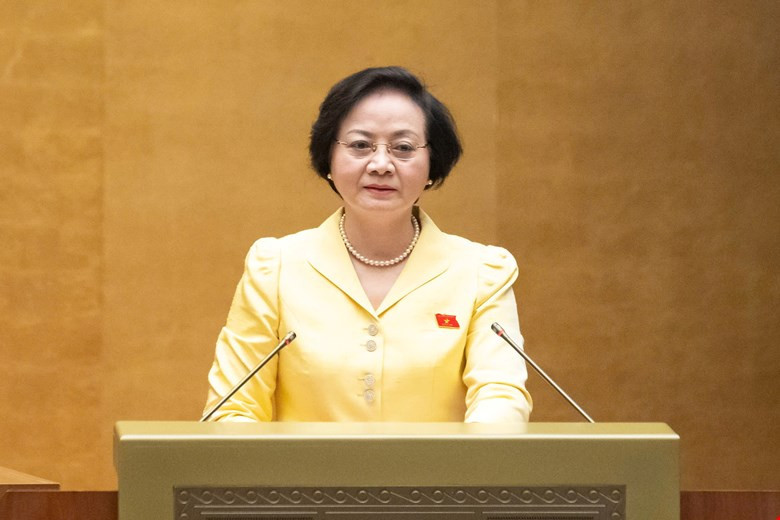
This is one of the new points of the draft amended Law on Cadres and Civil Servants presented at the National Assembly session on May 7 morning.
Presenting the draft law, Minister of Home Affairs Pham Thi Thanh Tra stated that one of the most significant amendments is the addition and refinement of regulations to implement the policy of building a unified, interconnected public service system from the central to the commune levels.
The draft law includes transitional provisions allowing commune-level cadres and civil servants elected or recruited before the law takes effect to be transferred to the administrative payroll of local authorities if they meet the required standards and conditions.
The draft also regulates the transition to managing cadres and civil servants based on job positions. Accordingly, the evaluation, placement, and utilization of cadres and civil servants must be based on the requirements of job positions, as well as their capacity, results, and task performance effectiveness.
The regulation on exams for promotions will be eliminated, replaced by a mechanism where individuals are appointed to the civil service rank corresponding to the job position they are assigned.
Civil service recruitment is designed to ensure that selected candidates immediately meet the job position’s requirements. Upon passing the recruitment process, candidates will be appointed and receive salaries based on the civil service rank corresponding to the job position, without a probationary period.
Regarding recruitment methods, agencies can flexibly use traditional competitive exams, merit-based selection, or direct recruitment for talented and experienced individuals from the private sector, public service units, or state-owned enterprises.
Additionally, recruiting agencies may sign fixed-term contracts with experts, scientists, or individuals meeting the standards and conditions to perform specific professional or technical civil service tasks.
The amended Law on Cadres and Civil Servants eliminates the national standardized input quality assessment for civil servants to promote decentralization in civil service management.
To enhance the effectiveness of screening cadres and civil servants, the draft mandates that evaluations be based on task performance results and specific work outputs aligned with the job position’s requirements, rather than general, formal, or subjective criteria.
The draft also proposes abolishing the "lifetime tenure" mindset, introducing regulations to screen and dismiss civil servants who fail to complete their tasks, and clearly defining the responsibilities of leaders in managing, evaluating, and utilizing civil servants according to their capabilities and appropriate job positions.
Asset, income declarations
Presenting the verification report, the National Assembly’s Law and Justice Committee endorsed the comprehensive amendment of the law for the reasons outlined in the Government’s presentation.
The committee assessed that the interconnection of commune-level cadres and civil servants with provincial levels is now sufficiently "mature" and it is urgent to support the restructuring of the administrative apparatus and the implementation of a two-tier local government model.
Regarding the principles of managing cadres and civil servants, the draft law sets the principle of “combining job title standards, job position requirements, and staffing quotas.”
The committee generally agreed with these provisions. However, some experts noted that maintaining this principle “won’t make a significant breakthrough and does not fully meet the requirement for boldly innovating methods for recruiting, evaluating, planning, training, developing, appointing, and utilizing cadres, civil servants, and public employees in the political system”.
Therefore, they proposed amending the principle and related regulations to manage cadres and civil servants based on job positions. This amendment would provide a legal basis for implementing salary payments based on job positions, in line with the spirit of the 2018 Resolution No 27 on reforming salary policies for cadres, civil servants, public employees, armed forces, and workers in enterprises.
Regarding the policies for talented individuals in public service, some opinions suggested adding some criteria to define “talented individuals” based on factors such as academic achievements, work performance, or contributions to their field, to ensure consistent application across ministries, sectors, and localities.
On civil servant evaluation, the committee generally supported the draft law’s provisions.
Additionally, the committee noted the Politburo’s requirement shown in Conclusion No105 on “incorporating asset and income declarations and their verification into the criteria for evaluating cadres, Party members, and the task performance of agencies, organizations, units, and their leaders.”
Thus, the committee proposed that the Ministry of Home Affairs study and include appropriate regulations to institutionalize this requirement.
Nguyen Thao